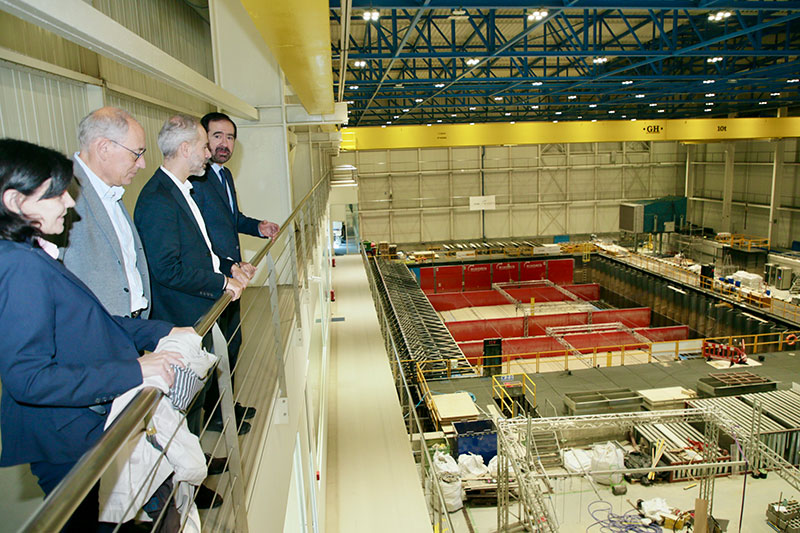IHCantabria will receive more than 1 million euros from the regional budget in 2025.

The Minister and the Director of Universities with Raúl Medina and José Antonio Juanes. José Antonio Juanes. Photo: Courtesy of Nacho Romero
The regional government and IHCantabria will work together to encourage vocational training students to carry out internships and receive training in the facilities of this institute.
The Government of Cantabria will allocate more than 1 million euros from the regional budget, by 2025, to the Institute of Environmental Hydraulics of the University of Cantabria(IHCantabria) as stated by the Minister of Education, Vocational Training and Universities, Sergio Silva, during his visit to the facilities of the research center.
In this visit, Minister Silva was accompanied by the Director General of Universities and University Policy, Marta Pascual, who were received at IHCantabria by its four directors: Raúl Medina, Director General; Íñigo Losada, Director of Research; Francisco Royano, Director of Technology Transfer, and José A. Juanes, Director of Teaching and Training.
As stated by the Minister, the Cantabrian Executive is aware of the importance of IHCantabria and its contribution to boost the research and technology sector, with projects aligned with the development strategy of the regional government to enhance the growth of Cantabria. For this reason, he has expressed his support to this initiative and his intention to “continue improving an economic collaboration that guarantees its funding to the extent of budgetary availabilities”, a financial support that, in his opinion, represents the clear commitment of the Cantabrian Executive to consolidate a “model of growth through science and knowledge”.
After the visit, Silva also highlighted the work carried out by IHCantabria within the implementation of the Complementary Marine Science Plan, led by the Ministry of Science, Innovation and Universities, and which has a budget of 50 million euros from the Recovery, Transformation and Resilience Plan and another four million euros from each of the participating autonomous communities: Cantabria, Galicia, Andalusia, Murcia and the Valencian Community. In this way, each region executes 10 million between 2022 and 2024 in the development of projects related to marine life, ocean preservation and the blue economy.
Recruiting trainees
For Raul Medina, apart from making the head of Education the way of working of IHCantabria and those areas in which research is done, it is essential to convey the need to recruit trainees, the quota of students who each year pass through the Institute of Hydraulics for training amounts to 35. According to Medina, apart from the research and transfer tasks, the educational and training part of IHCantabria is one of the main axes and, in this sense, he has claimed the support of the Regional Ministry of Education to recruit students for internships, especially those related to Vocational Training.
Silva has assured that, due to the evolution of academic degrees, it is increasingly necessary to expand the field of action where training practices can be carried out, and has shared with the director of IHCantabria the opinion that this space can be a field of training of “first order” to train future professionals of Cantabria.
In this sense, to give an idea of the dimension of the employment generation capacity of this infrastructure, Medina recalled that it has a staff of about 210 people, and that 70% of its funding comes from projects carried out abroad. “With our activity we are exporting science, we get our students to work here and live here and export science outside Spain”, a situation that the Minister of Education has described as “ideal”.
IHCantabria
The Institute of Environmental Hydraulics of the University of Cantabria (IHCantabria) is a mixed research center, which develops both research, technology transfer and training of specialists in relation to the water cycle in its various facets. This work has placed it among the national and international elite in the area of scientific-technological knowledge related to the integral water cycle in its various facets, including terrestrial environments through the development of a working methodology based on the integrated management of river basins, transitional waters and coastal areas.
Through applied research, IHCantabria seeks to expand the frontiers of knowledge of the sciences and technologies related to the water cycle and associated earth systems. Information about its progress and achievements in 2023 can be obtained through this link.



